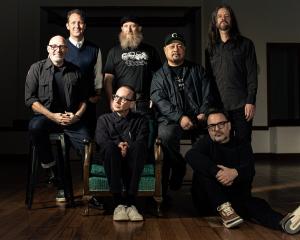With a new album out and a national tour beginning in the South next week, Black Seeds frontman Barnaby Weir discusses big gigs and big breaks with Shane Gilchrist.
What's in a name? Well, the title of the Black Seeds' fourth studio album, Solid Ground, says plenty.
It's both proclamation and, on listening, confirmation the Wellington dub-reggae outfit is in a good space.
Singer, guitarist and songwriter Barnaby Weir is on the phone from the capital.
He's explaining, in a downbeat fashion, what goes into his group's rather upbeat music.
For Solid Ground, the ingredients include pain and friendship.
Though he is not averse to discussing his breakup last year with fellow Wellington musician Hollie Smith, Weir is also quick to point out he is not the only member of the group to have had problems recently.
There have been other splits and, only last month, the Black Seeds cancelled seven shows on their European tour and returned home at the request of a bandmate who wanted to be near a seriously ill relative.
And gone is longstanding member Bret McKenzie, now replaced by Nigel Patterson.
Solid Ground is the first Black Seeds album not to feature the keyboard player, who has found fame as one half of high-flying comedy duo Flight of the Conchords.
Still, both parties continue to mingle: as of this week, the Conchords' debut album was sitting at No 6 in the New Zealand charts, the Seeds' Solid Ground three places above it.
Change and the fluidity of life are key themes on Solid Ground, Weir says.
He confirms tracks such as One Step At A Time, Take Your Chances and Love is a Radiation are a direct result of his split with Smith.
Despite the subject matter, the music is unlikely to prompt much shoe-gazing.
It's much too lively, maintaining the Black Seeds' connection with rootsy reggae while throwing in a twist of cop-show-theme funk with Afrophone and Rotten Apple.
Elsewhere, there is the more experimental dub of The Bubble, penned by saxophonist Jabin Ward, and the occasional dip into hip-hop via the intros of Make A Move and One Step At A Time.
Title aside, Solid Ground suggests the band is more than happy to remain on the course it first charted with 2001 album Keep On Pushing and built on with subsequent efforts On the Sun (2003) and Into The Dojo (2006), which spent five weeks at No 1 and sold more than 30,000 copies.
Weir agrees. It's more of the same, but different at the same time, he says. It's more challenging, more exploratory, but is unlikely to alienate those who have danced in the sun to 2003 single So True.
The influence of other members also continues to grow.
Whereas once Weir was the chief songwriter, now the credits are spread.
Much of the material for Solid Ground had been well honed before the band entered The Surgery, the Wellington studio it has helped develop with producer Lee Prebble.
Work in the former karate dojo was kept to a tight schedule to allow the band to fulfil tour commitments, including capitalising on its growing popularity in Europe, Weir explains.
"Europe is looking good, especially Germany, Holland and France, now that we've done all these festivals."
A recent highlight was playing the four-day Roskilde Festival in Denmark.
Regarded as one of the key events on the European music calendar, the festival featured a wide range of talent, from Radiohead, Neil Young, the Chemical Brothers and Nick Cave's Grinderman outfit to soul singer Solomon Burke.
Not bad company, really.
"Roskilde was amazing. I guess we've started to get in the bottom of the A-list or B-list touring bands."
After its New Zealand release through Rhythm Method in mid-August, Solid Ground is now being pushed in Europe by German label Sonar Kollectiv, a deal Weir sees as reward for the band's hard work on the Continent.
"There is definitely a strong work ethic. We have to gig; we have to promote our albums; we have to be in different places. It is hard work but the reason we're still together is because we still like the music and the fans still like to hear the music . . . It's still building."
The United States also beckons, though Weir is wary of the time, effort and expense such a campaign would require.
"We have got a few American fans now, especially through the Flight of the Conchords. For the right reasons and the right tour, we'd do it, but you have to pull back at some stage and choose cities you'd like to play rather than just play for the hell of it."
Weir says the next album is still likely to be two years away, a timeline to which the band has stuck, roughly, throughout its existence.
The approach has provided the eight-piece outfit with an album-tour-album continuity that means it is not starting from scratch each time.
Put simply, it remains in the public eye (and ears).
There are also avenues for other projects.
Take, for instance, Weir's Fly My Pretties sideline. The collection of Wellington-based musicians plays rarely, yet has released two live albums and has no problems filling venues when it does reconvene.
"I've been back in my own wee studio and making some mix tapes with a mate, and writing some new tunes, some perhaps for the Black Seeds, others perhaps for Fly My Pretties."
In modern marketing speak, such an approach is known as cross-pollination.
Yet Weir is cautious of milking the Fly My Pretties format.
"It's great to collaborate and it's great for people to do whatever they want. For me, when the Black Seeds have a break, it is a chance to still have a job and do something.
"Also, it is exciting that there is an audience that is really keen on whatever we put in front of them. They'll pay $50 to see something they don't know what they're about to see, so it needs to be good. I don't want to be repeating patterns . . . It is meant to be special."
Music has been a full-time occupation for the past four or five years for Weir, who turns 30 in December.
"The Black Seeds have been lucky. We've had some good funding [from NZ on Air] but it hasn't been easy from the start. We've had to show we are working on something.
"I think a lot of artists think 'I'm so brilliant but no-one knows.' The Flight of the Conchords didn't wait around for someone to discover them; they went to Edinburgh, to the United States and busted their balls and something cool happened to them.
"I am living off the music. Obviously, I've made some good money in the last couple of years but it comes in waves, on and off . . .
"We are finding good fees these days which is awesome, but we have to keep working hard. There are 10 people living off the band full-time - that's not including the families of the 10, so a lot of people depend on the band. You have to keep focused."
Asked whether that reliance on music to pay the bills could manifest as pressure to write songs, Weir emphasises he prefers not to confuse chords with cash.
"No, I feel lucky to be able to do this. I could play PlayStation all day if I want, but that's not going to write a song.
At the same time, you have to have a break. You've got to experience other sides of life as well, do some other stuff to get inspired.
"Then, when it's time to perform, you've just got to make it good."












